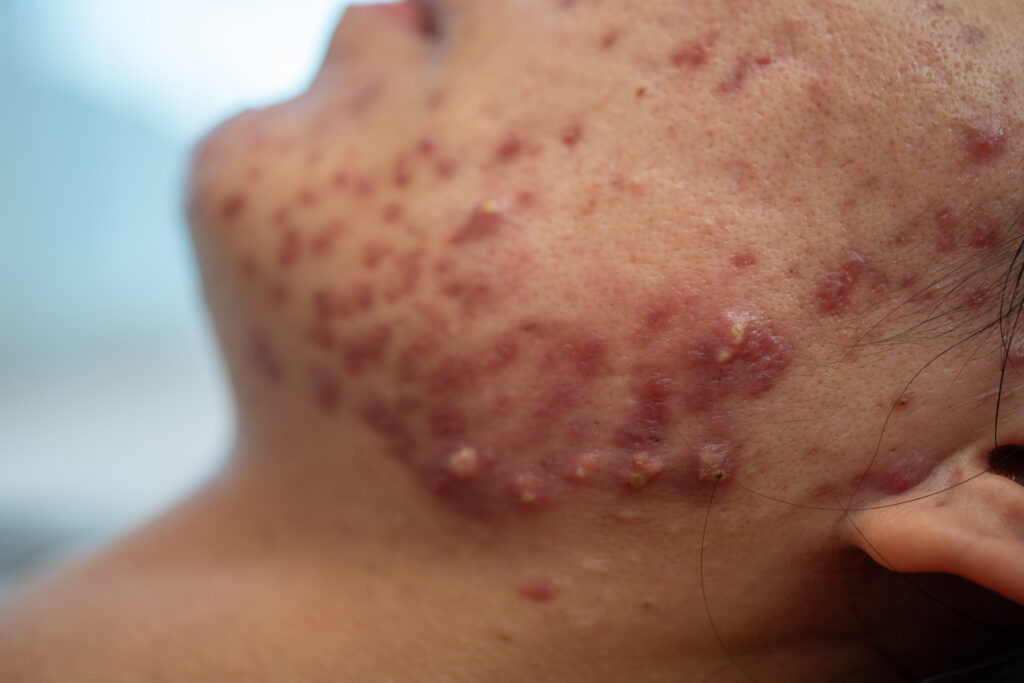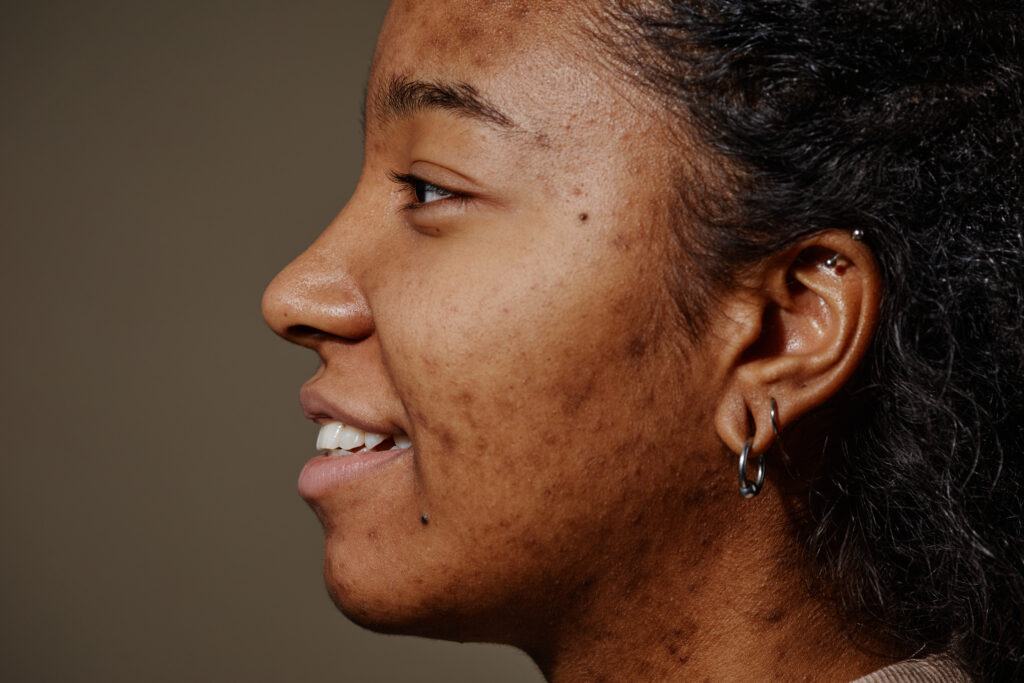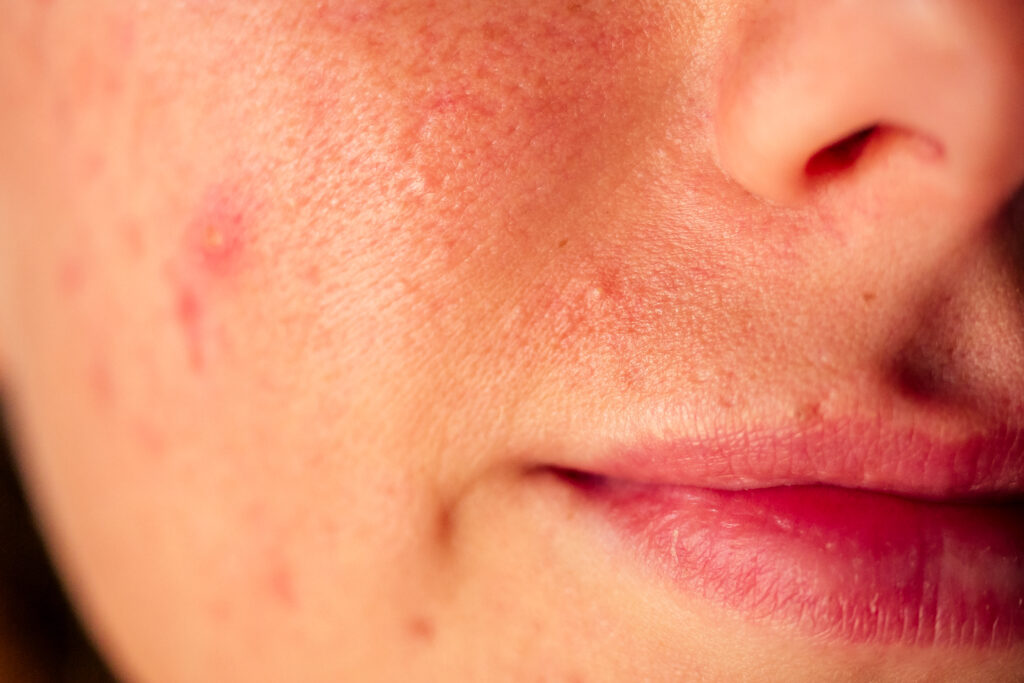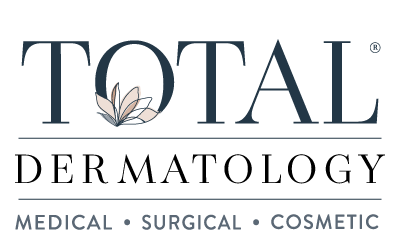Acne
Clearer Skin. More Confidence. Real Results.
Whether you’re a teen struggling with breakouts or an adult dealing with persistent acne, we understand how frustrating—and emotional—it can be. At Total Dermatology, we take a personalized medical approach to acne treatment for both teens and adults.
Our expert providers offer a full range of solutions, including topical prescriptions, oral medications, acne surgery, chemical peels, and laser treatments for both active acne and acne scars. We tailor each treatment plan to your skin type, lifestyle, and goals—so you’re not just masking acne, you’re treating it at the source.
Our goal? To help you achieve clear, healthy skin—and the confidence that comes with it.
Take control of acne with personalized care. Request your appointment today.


Causes
Acne is a common skin condition caused by blocked and inflamed pores. These blockages happen when oil (sebum), dead skin cells, dirt, and bacteria build up inside the hair follicles. While it’s most common during the teen years, acne can affect adults too—and it’s not always related to hygiene or diet.
During puberty, hormones trigger the sebaceous glands to produce more oil. When this oil gets trapped under the skin, it can form:
- Whiteheads (closed comedones)
- Blackheads (open comedones)
- Pimples and pustules (due to bacterial inflammation)
- Cysts and nodules (deep, painful lesions that may lead to acne scars)
Acne can also be influenced by genetics, stress, and hormone fluctuations, though it can occur even without a family history. Contrary to common myths, studies show that chocolate, soda, caffeine, and greasy foods are not major causes of acne for most people—and acne is not caused by poor hygiene.
Treatments
At Total Dermatology, we treat all types of acne—from mild to severe—with a customized plan that targets your specific skin needs and prevents long-term scarring.
The best acne treatment depends on the type and severity of your breakouts. We specialize in creating customized acne treatment plans—whether you’re dealing with occasional breakouts or more persistent cystic acne.
- Mild acne (mostly blackheads and whiteheads) is often treated with exfoliating cleansers that contain salicylic acid or glycolic acid, along with topical retinoids like adapalene, tretinoin, or tazarotene.
- As inflammation increases and papules or pustules develop (red bumps and pimples), we often add anti-inflammatory treatments such as benzoyl peroxide, topical antibiotics, or oral antibiotics to help reduce bacteria and redness.
- For patients with hormonal acne, we may recommend birth control pills, spironolactone, or other hormone-targeting medications to regulate oil production and prevent breakouts.
- Severe acne, especially when nodules and cysts are present, may require isotretinoin (formerly known as Accutane). This powerful oral medication is sometimes used as a first-line treatment when acne is severe or unresponsive to other therapies.
Rosacea
Understanding Rosacea: More Than Just Redness
Rosacea is a chronic skin condition that often resembles acne but requires very different treatment. It commonly affects the nose, cheeks, chin, and central forehead, usually starting with facial flushing or persistent redness. Over time, you may also notice red bumps (papules), whitehead-like bumps (pustules), and visible blood vessels (telangiectasias). In some cases, the eyelids and eyes can also become red, dry, or irritated—a condition known as ocular rosacea.
Rosacea is most common in women with fair skin, typically starting in the 20s or 30s and peaking between ages 40 and 60. While it’s less common in people with darker skin tones, it can still occur and may be underdiagnosed.
At Total Dermatology, our expert providers know that rosacea isn’t just a cosmetic concern—it can affect your comfort and confidence. We offer customized rosacea treatment plans to help reduce redness, manage flare-ups, and improve overall skin health.
Expert care for Rosacea, tailored to your skin. Request your appointment today.


Causes
The exact cause of rosacea is still unknown, but several factors are believed to contribute—including genetics, immune system response, and environmental influences. While conditions like stress, heredity, and gastrointestinal issues have been linked in some studies, none have been definitively proven as the root cause.
That said, certain rosacea triggers are well-known for making symptoms worse. These include:
- Sun exposure
- Hot beverages or foods
- Spicy dishes
- Alcohol
- Emotional stress
These triggers don’t cause rosacea, but they can exacerbate facial redness, flushing, and breakouts in people who are already prone to the condition.
At Total Dermatology, we help you identify your unique triggers and create a personalized rosacea treatment plan to reduce flare-ups and protect your skin long-term.
Treatments
Rosacea Treatment Options Tailored to You.
Managing rosacea starts with a gentle, consistent skincare routine and daily broad-spectrum sunscreen to protect and calm sensitive skin. From there, your treatment plan may include topical medications, oral antibiotics, or, in more severe cases, Isotretinoin—though this is rarely needed.
For patients struggling with visible blood vessels or overall facial redness, we also offer in-office treatments, including electrocautery, Intense Pulsed Light (IPL), and Pulsed Dye Laser.
These laser and light-based therapies can significantly reduce redness and visible veins, though it’s important to note they are typically considered cosmetic and may not be covered by insurance.
At Total Dermatology, we take a comprehensive and personalized approach to rosacea care. Our experienced providers work closely with you to create a treatment plan that addresses your specific symptoms, triggers, and skincare goals—so you can feel more comfortable and confident in your skin.
Don’t wait to find relief — request your rosacea appointment today.
